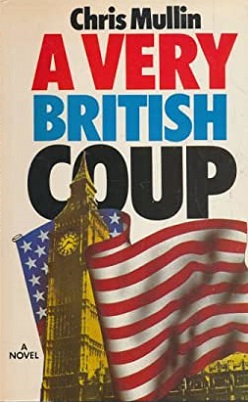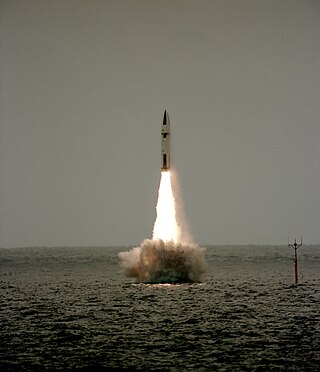Related Research Articles

In nuclear ethics and deterrence theory, no first use (NFU) refers to a type of pledge or policy wherein a nuclear power formally refrains from the use of nuclear weapons or other weapons of mass destruction (WMD) in warfare, except for as a second strike in retaliation to an attack by an enemy power using WMD. Such a pledge would allow for a unique state of affairs in which a given nuclear power can be engaged in a conflict of conventional weaponry while it formally forswears any of the strategic advantages of nuclear weapons, provided the enemy power does not possess or utilize any such weapons of their own. The concept is primarily invoked in reference to nuclear mutually assured destruction but has also been applied to chemical and biological warfare, as is the case of the official WMD policy of India.

Disarmament is the act of reducing, limiting, or abolishing weapons. Disarmament generally refers to a country's military or specific type of weaponry. Disarmament is often taken to mean total elimination of weapons of mass destruction, such as nuclear arms. General and Complete Disarmament was defined by the United Nations General Assembly as the elimination of all WMD, coupled with the “balanced reduction of armed forces and conventional armaments, based on the principle of undiminished security of the parties with a view to promoting or enhancing stability at a lower military level, taking into account the need of all States to protect their security.”

The 1964 United Kingdom general election was held on Thursday 15 October 1964. It resulted in the Conservatives, led by incumbent Prime Minister Alec Douglas-Home, narrowly losing to the Labour Party, led by Harold Wilson; Labour secured a parliamentary majority of four seats and ended its thirteen years in opposition since the 1951 election. Wilson became the youngest Prime Minister since Lord Rosebery in 1894. To date, this is also the most narrow majority obtained in the House of Commons, with just one seat clearing Labour for a majority government.

Desmond Henry Browne, Baron Browne of Ladyton, is a Scottish politician who served in the Cabinet of the United Kingdom under Tony Blair and Gordon Brown as Secretary of State for Defence 2006 to 2008 and Secretary of State for Scotland from 2007 to 2008. A member of the Labour Party, he was Member of Parliament (MP) for Kilmarnock and Loudoun from 1997 to 2010.

Clive Stafford Soley, Baron Soley is a Labour Party politician in the United Kingdom. He served as a Member of Parliament (MP) from 1979 to 2005, and later as a Member of the House of Lords until 2023.

A Very British Coup is a 1982 novel by British Labour politician Chris Mullin. The novel has twice been adapted for television; as A Very British Coup in 1988 and as Secret State in 2012.
European Nuclear Disarmament (END) was a Europe-wide movement for a "nuclear-free Europe from Poland to Portugal” that put on annual European Nuclear Disarmament conventions from 1982 to 1991.
Unilateral disarmament is a policy option, to renounce weapons without seeking equivalent concessions from one's actual or potential rivals. It was most commonly used in the twentieth century in the context of unilateral nuclear disarmament, a recurrent objective of peace movements in countries such as the United Kingdom.

In 1952, the United Kingdom became the third country to develop and test nuclear weapons, and is one of the five nuclear-weapon states under the Treaty on the Non-Proliferation of Nuclear Weapons.
Peggy Duff was a British political activist who started off her career with a protest against the treatment of German prisoners of war in Britain after the Second World War. She was principally known for her contribution to the peace movement as the organiser of the Campaign for Nuclear Disarmament. Duff was described by Noam Chomsky, a friend of hers, as "one of the people who really changed modern history".

Walter Jakob Wolfgang was a German-born British socialist and peace activist. Up to the time of his death, he was Vice-President of the Campaign for Nuclear Disarmament and Vice Chair of Labour CND, a caucus of CND members who are also members of the Labour Party. He was also a supporter of the Stop the War Coalition. Walter became better known to the general public after cameras recorded him being forcibly ejected from the annual Labour Party Conference in Brighton on 28 September 2005, aged 82, for shouting "nonsense" during Jack Straw's speech in which the then Foreign Secretary extoled the virtues of the government's role in the Iraq War. The eviction of Walter Wolfgang provoked much media comment and embarrassed the Labour leadership. The following morning he was re-admitted to conference to a standing ovation and an apology from the chair of the session.

Trident, also known as the Trident nuclear programme or Trident nuclear deterrent, covers the development, procurement and operation of nuclear weapons in the United Kingdom and their means of delivery. Its purpose as stated by the Ministry of Defence is to "deter the most extreme threats to our national security and way of life, which cannot be done by other means". Trident is an operational system of four Vanguard-class submarines armed with Trident II D-5 ballistic missiles, able to deliver thermonuclear warheads from multiple independently targetable re-entry vehicles (MIRVs). It is operated by the Royal Navy and based at Clyde Naval Base on the west coast of Scotland. At least one submarine is always on patrol to provide a continuous at-sea capability. The missiles are manufactured in the United States, while the warheads are British.
The 1960 Labour Party leadership election was held when, for the first time since 1955, the incumbent leader Hugh Gaitskell was challenged for re-election. Normally the annual re-election of the leader had been a formality. Gaitskell had lost the 1959 general election and had seen the Labour Party conference adopt a policy of unilateral nuclear disarmament which he considered disastrous and refused to support. A vacancy in the deputy leadership was first made by the death of incumbent Aneurin Bevan.

The anti-nuclear movement in the United Kingdom consists of groups who oppose nuclear technologies such as nuclear power and nuclear weapons. Many different groups and individuals have been involved in anti-nuclear demonstrations and protests over the years.
The 1960 Ebbw Vale by-election on 17 November 1960 was a by-election for a single seat in the House of Commons of the United Kingdom. Caused by the death of Labour Party Deputy Leader Aneurin Bevan, the constituency was very safely held by Labour and never in significant danger of changing hands. The selection of Michael Foot, a prominent left-winger out of sympathy with the party leadership on nuclear disarmament and other issues, led to a lively campaign. Foot's handy win was seen as causing problems for party leader Hugh Gaitskell.
The 13 steps are identified in a paragraph of the Final Document of the 2000 Review Conference of the Nuclear Non-Proliferation Treaty, providing a set of 'practical steps for the systematic and progressive efforts to implement Article VI of the Treaty on the Non-Proliferation of Nuclear Weapons'. Article VI is the part of the Treaty that provides for disarmament, including nuclear disarmament.

Mary Henrietta Kaldor is a British academic, currently Professor of Global Governance at the London School of Economics, where she is also the Director of the Civil Society and Human Security Research Unit. She also teaches at the Institut Barcelona d'Estudis Internacionals (IBEI). She has been a key figure in the development of cosmopolitan democracy. She writes on globalisation, international relations and humanitarian intervention, global civil society and global governance, as well as what she calls New Wars.

The United Kingdom's Polaris programme, officially named the British Naval Ballistic Missile System, provided its first submarine-based nuclear weapons system. Polaris was in service from 1968 to 1996.

The Campaign for Nuclear Disarmament (CND) is an organisation that advocates unilateral nuclear disarmament by the United Kingdom, international nuclear disarmament and tighter international arms regulation through agreements such as the Nuclear Non-Proliferation Treaty. It opposes military action that may result in the use of nuclear, chemical or biological weapons, and the building of nuclear power stations in the UK.
Hard Rock was a British civil defence exercise planned by the Conservative government to take place in September–October 1982. One of a series of regular national civil defence exercises, it followed Square Leg in 1980. As the public reaction to the scale of devastation forecast in Square Leg was poor, the planner deliberately scaled down the number of warheads supposed for Hard Rock. Despite this, the Campaign for Nuclear Disarmament (CND), who opposed nuclear warfare and were against civil defence exercises, suggested that such an attack as Hard Rock anticipated would have led to the deaths of 12.5 million people.
References
- 1 2 Rhiannon Vickers (15 December 2011). The Labour Party and the World Volume 2: Labour's Foreign Policy Since 1951. Oxford University Press. p. 114. ISBN 978-0-7190-6746-4.
- ↑ Labour Party. Sense about defense: the report of the Labour Party Defence Study Group. Quartet Books. ISBN 0704331942. Quoted in Vickers, 2011, p. 114
- ↑ Rhiannon Vickers (30 September 2011). The Labour Party and the World - Volume 2: Labour's Foreign Policy since 1951. Manchester University Press. p. 156. ISBN 978-1-84779-595-3.
- ↑ LPDSG (April 1982). Not all members of the group supported unilateral nuclear disarmament. Clive Soley was always opposed to unilateralism. Defence Security and Disarmament. Quoted in Vickers, 2011, p. 156.
- ↑ LPDSG (March 1983). Defence Industry Conversion and Economic Planning. Quoted in Vickers, 2011, p. 156.